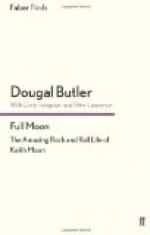“I’ll try once more,” murmured Barrant, almost to himself. He turned to her again, but this time he did not lay his hand on her arm. “Mrs. Thalassa”—he spoke more gently—“will you try and understand me?”
“Red on black ... black on red.” Her hands moved restlessly.
In a sudden recognition of the futility of trying to gather anything from that clouded brain, Barrant turned abruptly away without another word. And the black gaze of Thalassa followed him through the door and out into the darkness of the night.
CHAPTER XVII
The bell in the darkened chambers rang with the insistent clamour of mechanism responding with blind obedience to a human hand, but Mr. Anthony Brimsdown suffered it to pass unnoticed. As an elderly bachelor, living alone, he was sufficiently master of his own affairs to disregard the arrival of the last post, leaving the letters as they were tumbled through the slit in the door downstairs until he felt inclined to go and get them.
He was standing in the centre of the room examining an unusual trinket—a gold hoop like a bracelet, with numbers and the zodiac signs engraved on the inner surface. Mr. Brimsdown had discovered it in a Kingsway curiosity shop a week before. It was a portable sun-dial of the sixteenth century. A slide, pushed back a certain distance in accordance with the zodiac signs, permitted the sun to fall through a slit on the figures of the hours within—a dainty timekeeper for mediaeval lovers. Mr. Brimsdown was no gallant, nor had he sufficient imagination to prompt him to wonder what dead girl’s dainty fingers had once held up the bright fragile circle to the sun to see if Love’s tryst was to be kept. His joy in the sun-dial was the pride of the collector in the possession of a rare thing.
But that night it failed to interest him. He put it down with a sigh, and resumed his restless pacing of the room.
It was his office, but he preferred it to his chambers at the end of the passage. He said the air was better, but it is doubtful whether that was the reason. Perhaps Mr. Brimsdown felt less lonely among his legal documents, meditating over battles he had won for dead legatees. As a solicitor he was “strong on the Chancery side” and had gained some famous judgments for notorious litigants—men who had loved the law so well that their souls might well have been found—knowing no higher heaven—in the office where the records of their forgotten lawsuits were buried. And in death, as in life, they would have been glad to confide their affairs to the man whose lot it had been to add “Deceased” to so many of the names on the black steel deed-boxes which lined the shelves.
Mr. Brimsdown lived for the law. As a family lawyer he was the soul of discretion, an excellent fighter, wary and reticent, deep as the grave, but far safer. The grave sometimes opens and divulges a ghastly secret from its narrow depths. There was no chance of getting anything out of Mr. Brimsdown, dead or alive. He had no wife to extract bedroom confidences from him, no relations to visit in expansive moments, he trusted nothing to paper or diary, and he did not play golf. He was a solitary man, of an habitual secretiveness deepened by years of living alone.




